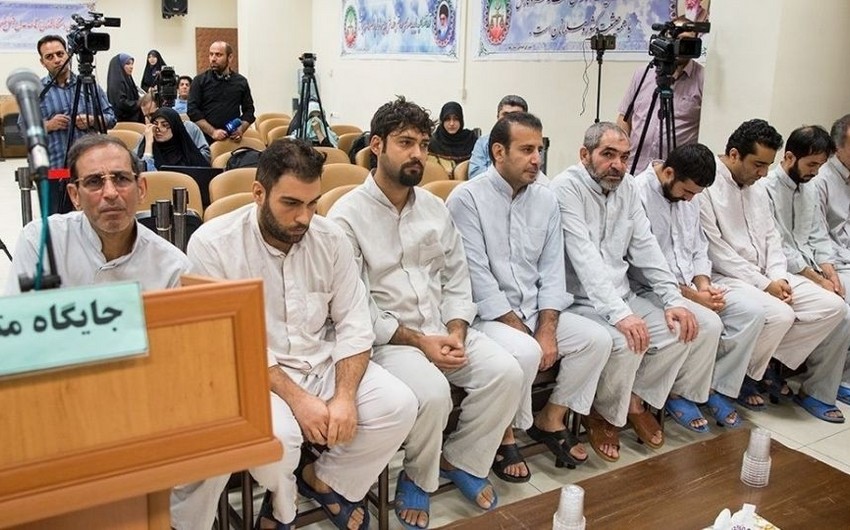Baku. 14 November. REPORT.AZ/ The situation still remains complicated in the Middle and Near East. Regional states that meet significant part of the world's hydrocarbon reserves are facing serious political, economic, and social challenges. Moreover, the authorities in Yemen, Syria, Libya and Iraq cannot completely control the country, and the tensions between Israel and Palestine remain. Iran, the richest state of the Middle East for its natural wealth, has been subjected to US economic sanctions. Naturally, restrictive measures deepened the political, economic and social problems which still remain unresolved after the revolution in the Islamic Republic, deepen with new ones emerging.
At present, Iran tries to identify the reasons behind the aggravated situation. Members of the former government are arrested, changes are made in the Cabinet of Ministers headed by President Hassan Rouhani, and members of the Mahmoud Ahmadinejad Cabinet, who was the head of the government in 2005-2013, are also arrested. Former Vice President of Iran Esfandiar Rahim Mashaei was sentenced to 6.5 years in September. He was sentenced to five years in jail for activity jeopardizing domestic and foreign security of the country, as well as one and a half year on two other charges that were not disclosed. By the way, Iranian President Mahmoud Ahmadinejad's press and public relations adviser, Ali akbar Javanfekr, was sentenced to four years in prison on similar charges. Notably, Isfandiar Rahim Mashaei was the Presidential Advisor and Vice President in 2005-2013. He was arrested for defending Hamid Rza Baka, a supporter of Mahmoud Ahmadinejad in March, 2018. Bakai was sentenced to 15 years in prison for misuse of public property. On September 11, his detention was extended for six months. Parviz Kazemi, who served Minister of Welfare and Social Security for one year in the first cabinet led by Mahmoud Ahmadinejad was charged with economic crimes and was taken to Tehran's Evin Prison on October 11. He was the Chairman of the Board of Directors of the Iranian Investment Bank and member of the Board of Trustees of the Teachers' Investment Fund.

As it is known, the Iranian spokesman, former intelligence and information security minister Ghulam Hussain Mohsun-Eje, said that 32 people in the world were convicted of corruption and suspected of economic crimes and were sentenced to 20 years of imprisonment while 3 of them were executed. By the way, golden jewelry merchant Vahid Mazloomi and his counterpart Muhammad Ismail Kasimi, who were charged with corruption and financial fraud in Iran, were executed on November 14 morning. Moreover, earlier, Iran's official media outlets spread information that Vahid Mazloomi, who also known as the "gold coin sultan", was detained with a 2 ton gold coin. It was alleged that Vahid Mazloomi had previously been informed about official decisions that would be made regarding currency and gold coin markets by his acquaintances working in the authorities. He bought all the gold coins in the market and set a new price with his partners.
In fact, these are considered as the measures taken by the government to overcome the current crisis. However such steps are mostly designed for public. It is possible to say that the ruling elite of Iran prevents possible protests through intimidation and force and threatens them. One of the ways to get rid of sanctions imposed by the United States is to hold negotiations with the international community. This can be considered the most basic means. Practical steps as a result of unforeseen or unexceptable negotiations can save Iran from the problems that it faces now or will face in the future. There are some messages about Iranian aspirations for dialogue.

Spokesperson of the Judicial System, Former Intelligence and Information Security Minister Ghulam Hussain Mohsen-Eje
Former Foreign Minister, chairman of Iran's strategic council on foreign relations Kemal Kharrazi said in an interview to France 24: "Saudi Arabia has always supported terrorism and killers of Iranians. This is their way of thinking. However, we are interested and ready to sit at the negotiating table with Saudi Arabia and other countries to create a better situation in the Middle East." 73-year-old Sayyid Kemal Kharazi was the foreign minister in 1997-2006, when the leader of the in-country reform line, former President Mohammad Khatami led the government. He studied in Tehran and at the University of Houston in the United States.
He is considered one of the reformists. By this way, Kemal Kharrazi explained the position of the ruling reformists. Since Egypt, Israel, Bahrain and Saudi Arabia, with which Iran does not maintain diplomatic relations, are the states of Middle and Near East. Additionally, though the United States is not involved in the region, it is considered one of the major powers. This begs a question of whether Kemal Kharrazi mean Israel and the US by saying, 'we are interested in and ready to sit at the negotiating table with Saudi Arabia and other countries'? It can be assumed that Iran is ready for negotiations with Israel and the United States, as he did not exclude any state in his interview. This also gives ground to say that the winds of crisis are felt stronger in Tehran. Kemal Kharrazi also tried to present himself as the one who seeks to prevent this phenomenon.
Thus, Iran responds to sanctions by executing merchants, arresting former members of the government, and declaring readiness for negotiations.


 https://images.report.az/photo/ca914f0b-c3ee-467a-a6b6-3d5dcc6730a4.jpg
https://images.report.az/photo/ca914f0b-c3ee-467a-a6b6-3d5dcc6730a4.jpg

